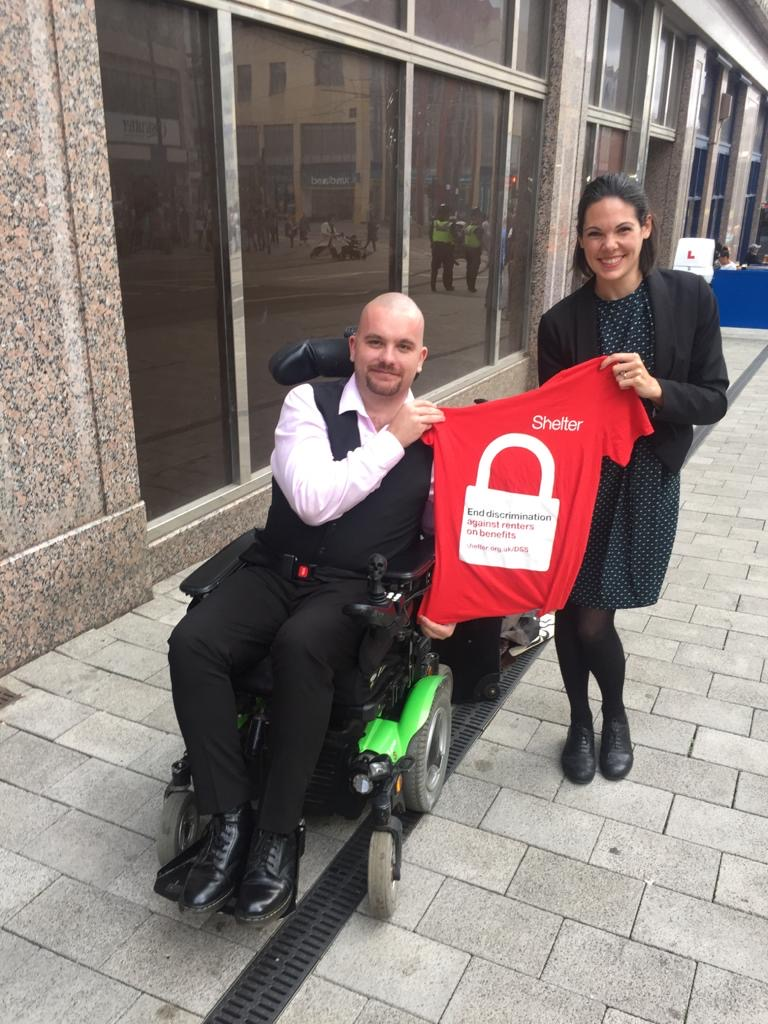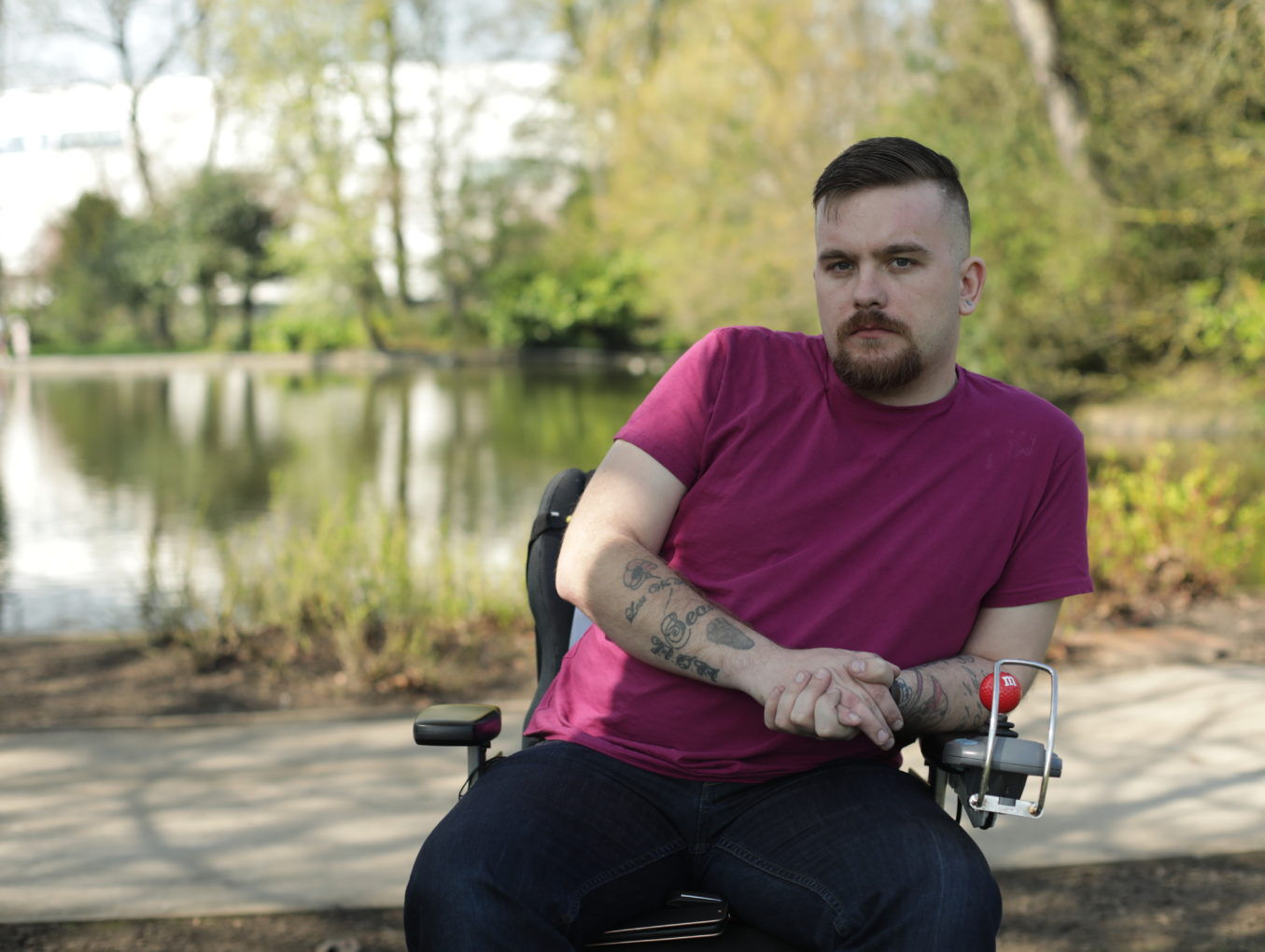Two months ago, we shared the news of a landmark court ruling declaring housing benefit discrimination unlawful, marking a huge breakthrough for our End DSS Discrimination campaign.
Yesterday, Stephen Tyler became the first person in England to win a full legal trial against housing benefit discrimination at Birmingham County Court, proving yet again that blanket bans against people receiving housing benefit are unlawful.

The court ruling
Supported by Shelter, Stephen, who is disabled, successfully proved ‘No DSS’ discrimination is unlawful and in breach of the Equality Act, after he was barred from viewing properties advertised by a Birmingham-based estate agent purely on the grounds of receiving housing benefit.
In a phone call with a member of staff at Paul Carr estate agent, Stephen was told that it was ‘company policy’ not to rent to people who receive housing benefit. During the trial, the agent did not admit to having a ‘No DSS’ policy when asked in court. But, with a copy of the property adverts he had applied for and his mobile phone log to prove the phone call had happened, Stephen’s evidence from the witness box was enough to convince the judge that Paul Carr did have a ‘no DSS’ policy.
The discrimination Stephen faced was deemed in breach of the Equality Act, because it disproportionally affects disabled people, who are more likely to need some support with paying their rent.
Shelter research shows that 45% of private renters who claim disability benefits like Disability Living Allowance or Serious Disability Allowance also claim housing benefit.
Having listened to the merits of the case, Her Honour Judge Mary Stacey ruled that:
‘There is no doubt that there was a blanket policy that no one in receipt of housing benefit would be considered for the three properties.
‘It put the claimant and other disabled people at a particular disadvantage when compared to others.
‘To be told simply, because of his benefit status, that he could not apply for three properties which were perfectly located for his children’s school, his GP and health needs, and extended family support, […] would be distressing.
‘We make a declaration that the defendant has unlawfully indirectly discriminated against the claimant by imposing a PCP [Provision, Criteria or Practice] that those in receipt of housing benefit could not apply to those three properties.’
Stephen’s story
The Tyler family lost their home in February 2018 after they asked the landlord to make some disability adaptations to their home, and the landlord responded by serving the family with a Section 21 ‘no-fault’ eviction notice.
When looking for a suitable new property to rent, Stephen was told by letting agent Paul Carr that it was ‘company policy’ to refuse to rent to people who receive housing benefit. This was despite him having a clean rental record and having always paid his rent on time.
Stephen has used a wheelchair since a road traffic accident in December 2016 and lives with mental health issues.
Following his accident, Stephen needs substantial personal care, which is mainly provided by his wife Irene, who also cares for their young children.
When the family couldn’t find a home because of DSS discrimination, Stephen made a homeless application to the council. Shelter’s legal team helped his family to secure the social home they live in now.
Speaking after yesterday’s court judgement, Stephen told us:
I feel relieved that it’s over. It’s been a very stressful time. It is amazing to have won – not just for me but for the tens of thousands of people like me facing this discrimination. Hopefully now it’s clear that the law is on our side, things will change.
The beginning of the end for DSS discrimination
Shelter has been fighting against ‘No DSS’ discrimination for the past two years, because as we see through our services it pushes people to the brink of homelessness. We also see how it wrongly leaves people feeling worthless.
This win proves yet again that blanket bans against people on housing benefit are unlawful because they overwhelmingly bar women and disabled people like Stephen, who are more likely to need help with their rent, from finding a safe home.
Now is the time for landlords and letting agents to do better. They have a crystal-clear judgment clarifying the law. They must now make sure they are acting within the law.
But we know that, sadly, proving something is illegal doesn’t immediately end its practice.
Since sharing the news of the first landmark court ruling in July, hundreds of people have contacted our services with similar stories. Too many renters continue to be on the receiving end of housing benefit discrimination, and we are still hearing of letting agents and private landlords ignoring the judgement.
But our campaign to make sure no one is denied their right to a safe home because of discrimination doesn’t stop here. We will carry on the fight until these discriminatory practices are stamped out for good.
If you are experiencing DSS discrimination while searching for a home, we’ve created a template letter you can use to send to the agent and challenge their behaviour.
You can also read about how we helped Shelter client Jane fight DSS discrimination in court.

